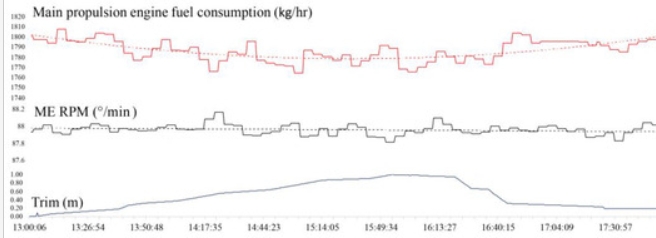
This paper presents the application of machine learning (ML) methods in setting up a model with the aim of predicting the energy efficiency of seagoing ships in the case of a vessel for the transport of liquefied petroleum gas (LPG). The ML algorithm is learned from shipboard automation system measurement data, noon logbook reports, and related meteorological and oceanographic data. The model is tested with generalized linear model (GLM) regression, multilayer preceptor (MLP), support vector machine (SVM), and random forest (RF). Upon verification of modeling framework and analyzing the results to improve the prediction accuracy, the best numeric prediction algorithm is selected based on standard evaluation metrics for regression, i.e., primarily root mean square error (RMSE) and relative absolute error (RAE). Experimental results show that, by taking an adequate combination and processing of relevant measurement data, RF exhibits the lowest RMSE of 17.2632 and RAE 2.304%. Furthermore, this paper elaborates the selection of measurement data, the analysis of input parameters, and their significance in building the prediction model and selection of suitable output variables by the ship’s energy efficiency management plan (SEEMP). In addition, discretization was introduced to allow the end user to interpret the prediction results, placing them in the context of the actual ship operations. The results presented in this research can assist in setting up a decision support system whenever energy consumption savings in a marine transport are at stake.